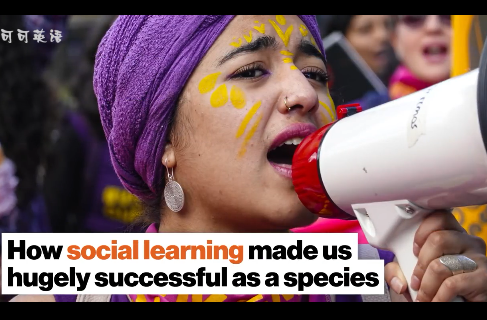We are very unusual as a species in that not only do we have the capacity to learn-- many species do this.
作为一个物种 我们很独特 因为我们不仅有学习能力——这一点很多物种都有
A fish in the sea learns that if it swims towards the light it will encounter prey there.
大海里的鱼知道 如果它朝着光游去 就会碰到猎物
We also have the capacity for social learning,
我们还有社会学习的能力
which itself is unusual and interesting-- that is, we can learn from each other.
它本身就很独特有趣——也就是说 我们能互相学习
And social learning is extremely efficient.
社会学习非常高效
For example, I can put my hand in the fire and learn that that's hot and pull my hand out.
比如 我可以把手放到火上 知道火很烫 会把手缩回来

So I have gotten some benefit of knowledge, but I've paid a price.
于是我学到了知识 但也付出了代价
Or I could watch you put your hand in the fire,
或者我可以看你把手放在火上
get almost as much benefit learning that fire is dangerous, and pay none of the price.
也可以学到火很危险的知识 但却不用付出任何代价
So watching from you and learning from you by social learning and imitative learning is extremely efficient.
所以通过社会学习和模仿学习看着你 从你那儿学习 这种方法极其高效
But we not only do that, we teach each other.
但我们不光如此 我们还会互相教授
We affirmatively set out to teach each other stuff.
我们会自主地去教别人知识
This is very rare in the animal kingdom.
这在动物界中很少见
In fact, this aspect of our species lies at the core of our capacity for culture,
其实 我们这一物种的这一特点是我们文化能力的核心
which is the capacity to transmit knowledge across place and time.
也就是跨越时空传播知识的能力
So we carry with us the benefits of all the innovations and all the learning
所以我们带着那些创新和知识所带来的好处
that had been done by all prior members of the human species, carried forward unto this day.
它们源于人类祖辈的实践和学习 一直延续到今天
And when we learn something new, we transmit it laterally to other people.
如果我们学到新知识 就会把它传给其他人
This fundamental quality of teaching also actually has political implications.
这个基本的教授特质其实也有政治意义
Because if we are actually to effectively teach and learn from each other,
因为我们要想有效地互相教学
we must create environments that support free and open expression.
就得营造出可以自由开放地表达观点的环境
How are we to learn from each other?
我们如何互相学习?
How are we to acquire novel information?
我们如何接受新信息?
How are we to work together to establish the truth of our environment
如果我们不培养和支持互相教学这一极好的天生特质
if we don't affirmatively foster and support this rather wonderful innate quality that we have to teach and learn from each other.
又该如何共同打造一个真实的环境呢
We are innately a friendly species,
我们是天生友好的物种
but we need environments which allow us to optimally express our inclination to be friendly.
但同时也需要能让我们尽情表达友好天性的环境
We don't want, for example, environments in which we're pitted against each other,
比如 我们不想要互相竞争的环境
where we have leaders that are kind of saying, these people are responsible for your problems.
不希望领导人告诉我们 这些人应该为你们的问题负责
We want environments which say, we can be united in our common humanity.
我们想要的是 告诉我们人性可以团结一致的环境
And analogously, we want environments which are supportive and conducive to teaching and learning.
同样地 我们想要一个支持并有利于教学的环境
We want environments-- we want to create environments in which we maximize the flow and the spread of information.
我们想创造出一个让信息的流动和传播最大化的环境
Some of the most foundational liberties that we have that are encapsulated in the Bill of Rights,
我们的开国元勋在《权利法案》中或明确或暗示的包含了
by some kind of implicit or deliberate insight by the founding fathers,
人类所拥有的最基本的自由
actually speak to these fundamental qualities that we evolved to have.
这恰好证实了我们进化而来所拥有的这些基本品质
For example, the freedom of assembly is enshrined in constitutions around the world, including ours.
比如 世界各国 包括美国在内的宪法中规定了人类有集会自由
The freedom of speech is enshrined in our constitution, and many others as well.
我们以及很多国家的宪法都规定了人们有言论自由
These are innate desires that we have to talk to and learn from each other, to assemble and connect with each other.
这些都是与生俱来的愿望 我们想要互相谈论和学习 想要聚会 跟他人联络
And they are seen as fundamental political principles and have been since our founding.
自我们的国家成立之初直到现在 它们都被视为基本的政治原则











